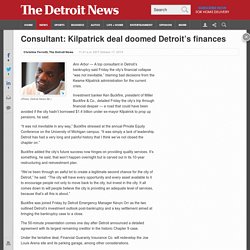

Cutting Public Sector Wages Will Make Recession Worse. Detroit Construction Exec Cops Plea In Bid-Rigging Case - Law360. Feds seize $500,000 in Detroit corruption probe tied to contractor Bobby Ferguson. VOICE OF DETROIT: The city's independent newspaper, unbossed and unbought. Jim Casha (center) with mother Anna Casha at left and brother Jerry Casha at right Grand Rapids Press photo/Jon Brouwer “It’s not just about the Kilpatrick administration”–Jim Casha Tunnel Inspector battled Feikens, FBI, contractors, mayors, prosecutors, state, to stop nearly half-billion dollars in fraud, pollution linked to Rouge projects By Diane Bukowski DETROIT – Tunnel Inspector Jim Casha lives in Canada now, but after more than a decade he is still waging a war to compensate Detroiters for what he says totals close to $1/2 billion in mismanagement, malfeasance, possible fraud and bid-rigging and environmental hazards perpetrated by the Detroit Water and Sewerage Department (DWSD) and it’s contractors since 1999.

He says that amount was wasted on two projects alone. (Both projects are described at published by the construction law firm of Cavanaugh and Quesada, PLC.) THE MONEY PIT: Shaft over flooded tunnel, located at W. Terry Casha as a youth Terry Casha in prison MDOC photo Atty. U. Crain's Detroit Business : Subscription Center. Timeline Of Detroit’s Financial Crisis. DETROIT (AP) — A timeline of Detroit’s financial troubles: — Detroit issues $1.44 billion of new debt in the form of pension obligation certificates to fund the city’s two retirement systems.

A 30-year repayment schedule is negotiated. Then-Mayor Kwame Kilpatrick agrees to swap a fixed interest rate for a variable one. A market rate increase would be to the city’s benefit. Falling rates mean Detroit would pay more. — City issues $250 million in bond debt and begins seven-year run of posting at least $150 million in annual budget deficits. . — Interest rates begin to fall during national recession. — Due to falling interest rates, Detroit is required to pay an additional $1.14 billion in interest and hedging derivatives as part of the certificate of participation and swaps agreements. . — Short term cash flow shortages become more severe. . — The city has no deficit reduction plan and debt continues to soar. Consultant: Kilpatrick deal doomed Detroit’s finances. Ann Arbor — A top consultant in Detroit’s bankruptcy said Friday the city’s financial collapse “was not inevitable,” blaming bad decisions from the Kwame Kilpatrick administration for the current crisis.

Investment banker Ken Buckfire, president of Miller Buckfire & Co., detailed Friday the city’s trip through financial despair — a road that could have been avoided if the city hadn’t borrowed $1.4 billion under ex-mayor Kilpatrick to prop up pensions, he said. “It was not inevitable in any way,” Buckfire stressed at the annual Private Equity Conference on the University of Michigan campus. The Post-Post-Apocalyptic Detroit. Photo In downtown Detroit, at the headquarters of the online-mortgage company Quicken Loans, there stands another downtown Detroit in miniature.

The diorama, made of laser-cut acrylic and stretching out over 19 feet in length, is a riot of color and light: Every structure belonging to Quicken’s billionaire owner, Dan Gilbert, is topped in orange and illuminated from within, and Gilbert currently owns 60 of them, a lordly nine million square feet of real estate in all. He began picking up skyscrapers just three and a half years ago, one after another, paying as little as $8 a square foot. He bought five buildings surrounding Capitol Park, the seat of government when Michigan became a state in 1837. He snapped up the site of the old Hudson’s department store, where 12,000 employees catered to 100,000 customers daily in the 1950s. Property costs have dropped to the point that barriers to ownership — to a sort of mogulhood, even — are absurdly low.
Continue reading the main story. Thousands go without water as Detroit cuts service for nonpayment. It has been six weeks since the city turned off Nicole Hill's water.

Dirty dishes are piled in the sink of her crowded kitchen, where the yellow-and-green linoleum floor is soiled and sticky. A small garbage can is filled with water from a neighbor, while a bigger one sits outside in the yard, where she hopes it will collect some rain. She's developed an intricate recycling system of washing the dishes, cleaning the floor and flushing the toilet with the same water. "It's frightening, because you think this is something that only happens somewhere like Africa," said Hill, a single mother who is studying homeland security at a local college.
"But now I know what they're going through — when I get somewhere there's a water faucet, I drink until my stomach hurts. " Hill is one of thousands of residents in Detroit who have had their water and sewer services turned off as part of a crackdown on customers who are behind on their bills. Alana.semuels@latimes.com Copyright © 2015, Los Angeles Times.